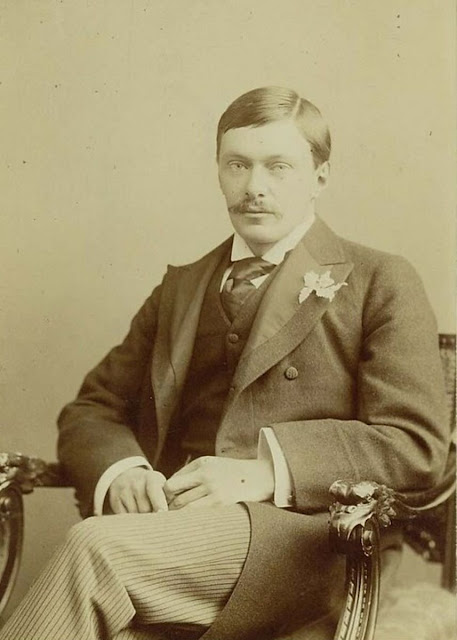Tales of Mystery and Imagination
Tales of Mystery and Imagination
" Tales of Mystery and Imagination es un blog sin ánimo de lucro cuyo único fin consiste en rendir justo homenaje a los escritores de terror, ciencia-ficción y fantasía del mundo. Los derechos de los textos que aquí aparecen pertenecen a cada autor.
Las imágenes han sido obtenidas de la red y son de dominio público. No obstante, si alguien tiene derecho reservado sobre alguna de ellas y se siente perjudicado por su publicación, por favor, no dude en comunicárnoslo.
Edward Frederic Benson: Bagnell Terrace
Manuel Vázquez Montalbán: Desde un alfiler a un elefante
Elizabeth Gaskell: Disappearances
I am not in the habit of seeing the Household Words regularly; but a friend, who lately sent me some of the back numbers, recommended me to read "all the papers relating to the Detective and Protective Police," which I accordingly did - not as the generality of readers have done, as they appeared week by week, or with pauses between, but consecutively, as a popular history of the Metropolitan Police; and, as I suppose it may also be considered, a history of the police force in every large town in England. When I had ended these papers, I did not feel disposed to read any others at that time, but preferred falling into a train of reverie and recollection.
First of all I remembered, with a smile, the unexpected manner in which a relation of mine was discovered by an acquaintance, who had mislaid or forgotten Mr. B.'s address. Now my dear cousin, Mr. B., charming as he is in many points, has the little peculiarity of liking to change his lodgings once every three months on an average, which occasions some bewilderment to his country friends, who have no sooner learnt the 19 Belle Vue Road, Hampstead, than they have to take pains to forget that address, and to remember the 27 1/2 Upper Brown Street, Camberwell; and so on, till I would rather learn a page of "Walker's Pronouncing Dictionary," than try to remember the variety of directions which I have had to put on my letters to Mr. B. during the last three years. Last summer it pleased him to remove to a beautiful village not ten miles out of London, where there is a railway station. Thither his friend sought him. (I do not now speak of the following scent there had been through three or four different lodgings, where Mr. B. had been residing, before his country friend ascertained that he was now lodging at R --.) He spent the morning in making inquiries as to Mr. B.'s whereabouts in the village; but many gentlemen were lodging there for the summer, and neither butcher nor baker could inform him where Mr. B. was staying; his letters were unknown at the post-office, which was accounted for by the circumstance of their always being directed to his office in town. At last the country friend sauntered back to the railway-office, and while he waited for the train he made inquiry, as a last resource, of the book-keeper at the station. "No, sir, I cannot tell you where Mr. B. lodges - so many gentlemen go by the trains; but I have no doubt but that the person standing by that pillar can inform you." The individual to whom he directed the inquirer's attention had the appearance of a tradesman - respectable enough, yet with no pretensions to "gentility," and had, apparently, no more urgent employment than lazily watching the passengers who came dropping in to the station. However, when he was spoken to, he answered civilly and promptly. "Mr. B.? tall gentleman, with light hair? Yes, sir, I know Mr. B. He lodges at No. 8 Morton Villas - has done these three weeks or more; but you'll not find him there, sir, now. He went to town by the eleven o'clock train, and does not usually return until the half-past four train."
Alfredo Julio Grassi: El dulce color de las estrellas
Clifford Donald Simak: Mirage
Carmen Rosa Signes Urrea: La cuerda
Enseñar a un niño a no pisar
una oruga es tan valioso para el
niño como lo es para la oruga.
Bradley Millar
La cuerda sonó templada. De haberlo sabido hacer hubiese podido arrancar de ella las notas de una canción. Arrastraba sus pies por la superficie tensa asegurando cada paso, antes de emprender el siguiente en un balanceo constante. Le resultó curioso sentirse tan ligero como para hacer sin riesgo aquel temerario ejercicio de equilibrio y destreza. Pese a desconocer la profundidad del abismo que se perdía bajo él, se dejó engañar por la atracción gravitatoria que generaba su nave y que, como un invisible hilo, le sujetaba para evitar peligros. Y así descubrió la gama de colores que la luz reflejaba en los objetos que le rodeaban. Como pétalos de flor sobre su cabeza, grandes hojas filtraban los rayos de aquel decadente sol.
Había llegado el momento de recoger muestras. En cada uno de los frascos fue colocando: líquidos, fragmentos de hoja, flores, frutos y cortezas, incluso cargó el proyectil de rayos para poder tomar cenizas de un trozo de aquella cuerda por la que caminaba.
Le gustaban los retos, se crecía ante las dificultades, por eso cuando le dijeron que se buscaba un sustituto para ser el primero en valorar el potencial de aquel planeta y explorarlo libremente, se ofreció voluntario.
La alarma sonora le alertó de nuevo del tiempo que llevaba empleado. En breve debía sustituir las baterías que sustentaban su equipo, virar sobre sus pasos, regresar con prontitud. En realidad tenía que haberlo hecho mucho antes, cuando el primer aviso luminoso apareció, pero le pilló tan absorto en la observación que no fue capaz de verlo.
La estridente señal, tres pitidos cortos y uno largo y grave, retumbó de tal forma que le sorprendió. Le pareció que estaba solo. Aquel era un mundo silencioso. El único sonido perceptible se podía identificar como el crecimiento de aquella descomunal vegetación. Lo más curioso de todo se manifestó en la cuerda que le sostenía, que vibraba al ritmo de la marca sonora y que se repitió varias veces.
Dan Simmons: Vexed to Nightmare by a Rocking Cradle
Salomé Guadalupe Ingelmo: Alba Mater. Bendito el fruto de tu vientre / Alba Mater. Blessed is the fruit of your womb
Era virtud no permanecer
Ir a nuestra heroica, terca manera
A buscarla en la cima del volcán
Entre témpanos de hielo
O donde el rastro se desvanece
Robert Graves, La diosa blanca
Hector Hugh Munro (Saki): Gabriel-Ernest
"There is a wild beast in your woods," said the artist Cunningham, as he was being driven to the station. It was the only remark he had made during the drive, but as Van Cheele had talked incessantly his companion's silence had not been noticeable.
"A stray fox or two and some resident weasels. Nothing more formidable," said Van Cheele. The artist said nothing.
"What did you mean about a wild beast?" said Van Cheele later, when they were on the platform.
"Nothing. My imagination. Here is the train," said Cunningham.
That afternoon Van Cheele went for one of his frequent rambles through his woodland property. He had a stuffed bittern in his study, and knew the names of quite a number of wild flowers, so his aunt had possibly some justification in describing him as a great naturalist. At any rate, he was a great walker. It was his custom to take mental notes of everything he saw during his walks, not so much for the purpose of assisting contemporary science as to provide topics for conversation afterwards. When the bluebells began to show themselves in flower he made a point of informing every one of the fact; the season of the year might have warned his hearers of the likelihood of such an occurrence, but at least they felt that he was being absolutely frank with them.
What Van Cheele saw on this particular afternoon was, however, something far removed from his ordinary range of experience. On a shelf of smooth stone overhanging a deep pool in the hollow of an oak coppice a boy of about sixteen lay asprawl, drying his wet brown limbs luxuriously in the sun. His wet hair, parted by a recent dive, lay close to his head, and his light-brown eyes, so light that there was an almost tigerish gleam in them, were turned towards Van Cheele with a certain lazy watchfulness. It was an unexpected apparition, and Van Cheele found himself engaged in the novel process of thinking before he spoke. Where on earth could this wild-looking boy hail from? The miller's wife had lost a child some two months ago, supposed to have been swept away by the mill-race, but that had been a mere baby, not a half-grown lad.
Rafael Marín: Volver a Sitges
Alfonso Sastre: Desde el exilio
Michael Swanwick: Scherzo with Tyrannosaur
Enjoying yourself, son?
What do you think spooked them? Was it a —?Then he saw the wranglers in their jeeps and his face fell.
Oh.
We had to cheat a little to give the diners something to see.I gestured with the wine glass past the herd, toward the distant woods.But there are plenty of predators lurking out there — troodons, dromaeosaurs … even old Satan.
Satan is our nickname for an injured old bull rex that’s been hanging around the station for about a month, raiding our garbage dump.
A tyrannosaur is an advantageous hunter,I said,like a lion. When it chances upon something convenient, believe you me, it’ll attack. And when a tyrannosaur is hurting, like old Satan is — well, that’s about as savage and dangerous as any animal can be. It’ll kill even when it’s not hungry.
Good,he said.
I’m glad.














